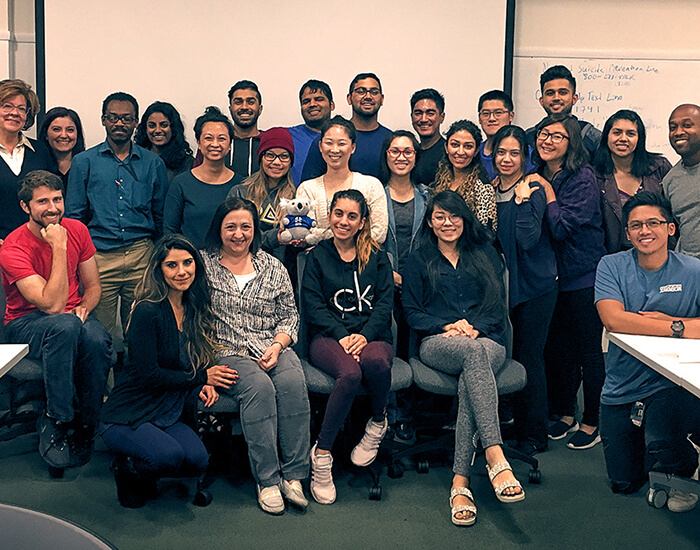On Saturday, Feb. 10, a group of 25 third-year students from the Keck Graduate Institute (KGI) School of Pharmacy and Health Sciences took advantage of an opportunity to receive Mental Health First Aid (MHFA) training.
The eight-hour course was taught by Lise Porter, a trainer for Mental Health First Aid USA, and Talia Puzantian, an associate professor of clinical sciences at KGI.
“The students found the training to be engaging and powerful,” Puzantian said. “They left the training with practical tools—with potentially profound benefits—to assist individuals who may be suicidal, intoxicated, psychotic, or having a panic attack or reaction to a traumatic event.”
Upon completion of the course, the KGI students earned three-year MHFA certification. Mental Health First Aid USA is a training—like regular First Aid or CPR—designed to give people the skills to help someone who is developing a mental health problem or experiencing a mental health crisis.
“The biggest takeaway from the MHFA training was that the gift of listening non-judgmentally goes a long way,” said Kristina Joo, PharmD ‘19. “Often, we are too busy trying to get others to listen to us, when in reality people just want to be understood, especially through hard times.”
The course used role-playing and simulations to demonstrate how to recognize and respond to the warning signs of specific illnesses. In this particular training, the instructors utilized scenarios and cases specific to pharmacy practice.
Mental Health First Aid teaches participants a five-step action plan, ALGEE, to support someone developing signs and symptoms of a mental illness or in an emotional crisis:
- Assess for risk of suicide or harm
- Listen nonjudgmentally
- Give reassurance and information
- Encourage appropriate professional help
- Encourage self-help and other support strategies
Like CPR, Mental Health First Aid prepares participants to interact with a person in crisis and connect the person with help. First Aiders do not diagnose or provide any counseling or therapy. Instead, the program offers concrete tools and answers key questions like, “What do I do?” and, “Where can someone find help?”
MHFA training has been shown to increase knowledge, reduce stigma, and increase supportive actions. Pharmacists adequately trained in mental health can more confidently and effectively communicate with and provide care to those with mental illness.
“Pharmacists have a tremendous opportunity to positively impact the lives of those with mental illness, yet stigma and lack of training often pose a significant barrier,” Puzantian said. “MHFA training can improve pharmacists’ abilities and confidence to engage with all patients.”
